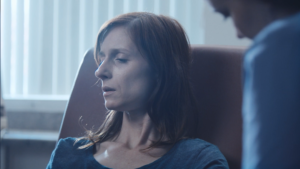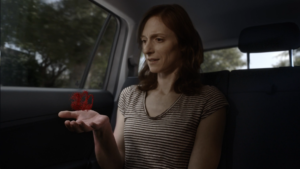Written and directed by Terry and Larry Ziegelman, “Broken Vessels” tackles somber subjects far from usual horror fare: cancer and domestic violence. The film begins with the terrors of a chemotherapy infusion, which Jane, the lead, faces with quiet dignity, and gradually reveals more about Jane’s struggles with an elusive form of blood cancer and a husband who abuses her verbally, emotionally, and physically without regard for her weakened state. Jane’s situation is horrifying, and the film builds tension and suspense as it unfolds. Taking full advantage of how sympathetic and likable Jane is as she faces such adversity, the Ziegelmans create a rich emotional world.

Much of this richness of feeling stems from Alicia’s Blasingame’s exceptional performance as Jane. Her highly emotive facial expressions, enhanced by well-framed close cinematography by Daniel Gomez Bagby, tell much of the story, conveying her dread of the needle involved in her chemotherapy and, more deeply, her dread of her husband, revealing his abusiveness long before it appears onscreen. The other actors provide excellent support, with Aaron Gaffey playing her husband, Scott, as believably creepy and revolting, and Cathy Vu playing her partner in chemotherapy, Naomi, as an inspirational voice who dresses as Wonder Woman and Batman as she fights stage four colon cancer. Naomi says at one point, “Cancer makes you strong, a fighter,” and though Naomi’s costumes make her look the fighter part, the film makes clear that Jane has an enormous well of strength. Indeed, simply surviving both cancer and Scott makes her a hero.
The title, “Broken Vessels,” is provocative because it refers to several aspects of the story, one of which Jane and Naomi defy through their heroism: though they might at times feel broken, they ultimately refuse to be vessels broken by their illnesses when they choose to fight. If anyone is a broken vessel, it’s Scott, who looks forlornly at a framed news article about his past glories before settling into his abusive patterns.
“Vessels” also refers to Jane’s blood cancer, presumably the blood vessels broken by the mysterious disease, but the film has some tricks to perform beyond its realistically horrifying foundation. As the short runtime progresses—it clocks in at about twenty minutes—a storyline that qualifies as sci-fi or supernatural (take your pick) comes to the fore. Jane has a peculiar relationship with blood that might just work in her favor; it certainly works in the film’s favor, providing opportunities for dazzling effects.

As Jane’s potential grows and the film’s other tensions escalate, subtle, somewhat ethereal music by Ryan McLean becomes increasingly intense, preparing a final conflict that is thoroughly satisfying. There’s an added twist from the notion of “chemo brain”—likely familiar to viewers who have been or been close to someone going through chemotherapy—and knowing that Jane hallucinates, but one way to understand the film is as less of a horror story and more of superhero’s origin story. You’ll have to see for yourself if that idea fits with how the film strikes you.
However you end up feeling about the characters and events of “Broken Vessels,” the film is unquestionably a thoughtful and moving experience admirable for its adroit handling of sensitive subjects. It’s also visually engaging and exciting, likely to meet demands for fun as well as reflection.
Reviews of Top Horror Film Shorts for MiSciFi
L. Andrew Cooper, Ph.D.
https://landrewcooper.com